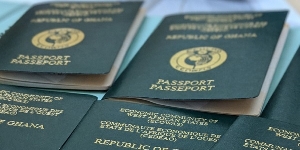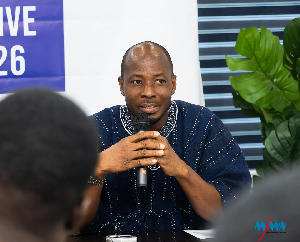Thursday November 4 1999
INTERVIEW WITH THE FT: The journey to democracy President Jerry Rawlings, due to step down next year, reflects on the burdens of office, and says: "I will be glad of some freedom"
FT: Looking back is there anything you would have done differently?
Broadly speaking, I can say I have been faithful to the principles which we set out to establish, but when it comes to implementation, I admit that some policies and performances could have been differently pursued.
Is it now certain that the man you have endorsed as your successor, John Atta Mills, will be endorsed by the party?
I have not endorsed anyone as my successor. I have stated that if he decides to contest the presidential slot, I will support him. He has won my admiration for his dedication and hard work. If the NDC and its partners in the Progressive Alliance give Professor Mills the go-ahead, it will not be because of any endorsement by me, but because he has proved himself equal to the task of leading our country in the next millennium.
What role do you expect to play after you stand down?
I cannot afford the luxury of "expecting". I am, however, hoping that I will have the freedom to continue to work with my people and also make my humble contribution to Africa's progress, peace and stability.
Are there circumstances under which you can see yourself returning to politics?
In the sense that politics means taking an active interest in what goes on around us and having a commitment to social justice, I don't think I will have the liberty of being out of it. But in the formal sense, I will have served more than 19 years of hard labour and, as Nelson Mandela said when he stepped down, I will be glad of some freedom.
Although the economy has made a remarkable recovery it is still heavily dependent on the donors. Did you expect this aid relationship to last as long as it has and when do you think it will end?
We would be much closer to a very substantial reduction in dependency on aid if we did not have to deal with frequent external shocks and obstacles. Major fluctuations in world commodity prices have hit us hard in our exports and imports, while quotas and tariff barriers in the so-called "free" market world economy prevent us from maximising the fruits of our efforts. We must also admit to some inefficiencies, but I believe our favoured status with the donor community is due to our genuine efforts to use aid responsibly. We should also remember that much of the so-called "aid" consists of loans which we are working hard to repay.
The support of the World Bank and other donors has been critical but do you think they have always got it right?
No, they have not, and we have been quite frank about cumbersome procedures, too many strings and conditions and the lack of understanding of the real needs of our people. This said, however, there has been a great improvement over the years. Partnership, dialogue and mutual understanding now characterise our relations with the donor agencies. We are ready to accept criticism where it is due, but we are also ready to point out the need to modify projects and programmes to suit our objective conditions.
Do you agree with the Bank's apparent insistence on privatisation of the Cocobod?
The Cocobod, which we inherited, was a bloated monster which fed itself on the sweat of our farmers, leaving little for producer prices or for revenue to government. We turned it into a downsized, efficient organisation which has greatly reduced its own costs, has given our farmers a steadily improving deal and has brought in very substantial revenues until the recent severe decline in world cocoa prices. Cocoa purchasing has been open to the private sector for several years now. We are not against privatisation per se, as we have demonstrated in our divestiture programme, but we feel that certain changes in the cocoa sector, on which so many of our people depend, should be approached with some degree of caution. At the moment, the Cocoa Services Division is being restructured, with some of its functions going to the Agricultural Extension Service, for example. Cocobod will change, but let us not be in too much of a hurry.
What role is the government playing in the Ashanti Goldfields negotiations? What are your objectives? Are there any circumstances under which you would sell the government stake in Ashanti?
The issue of Ashanti Goldfields (AGC) does not lend itself to simple questions and answers. It must be understood as a matter that resonates at the very core of the people of this country. The colonial powers correctly called this country the Gold Coast. The gold of AGC is a symbol of our national sovereignty and we will not do anything that is tantamount to a betrayal of posterity
Over the years parts of this important heritage have been disposed of to generate revenue to reinvest in the economy. We have done this within the context of far-reaching economic reforms, of the freedom of the marketplace and the challenges of globalisation. But we also owe a duty to prevent our economy and our people from being taken as hostages in the process. The basic issue is that AGC still has an immense potential. As a government we are concerned that in resolving its current problems we should protect the national interest against those who would want to collaborate to manipulate such situations to their own advantage.
You recently marked the 20th anniversary of the June coup, an event which has prompted calls for a South African-style Truth and Reconciliation Commission. Do you think it is necessary?
I don't wish to quibble over your use of words, but the events of June 4, 1979 did not constitute a coup. Nobody set out to overthrow the military government of the day. I was on trial before a military court martial for an action intended to call attention to corruption within the armed forces. I was freed from my cell by a spontaneous uprising of soldiers who were quickly joined by civilians angered by years of injustices, misrule and hardship.
I had to take charge to prevent a chaotic bloodbath. I literally spent those four months cooling down the anger of the masses despite the price that the military generals paid. We had to impose life-long sentences on others to prevent them being executed.
You don't have to be a social psychologist to appreciate the fact that the revolt of June 4, 1979 was a reaction to years of abuse under different regimes - it was the effect, not the cause. There is no doubt that in the heat of the events, as well as in the early days of the revolution which began on December 31, 1981, there were some injustices.
We have investigated many complaints and petitions and where genuine mistakes or injustices have been found, compensation has been paid, confiscated properties have been returned, and perpetrators of crimes have been punished. However, it is doubtful whether a truth and reconciliation commission would purge the country of bitter memories or would instead re-open wounds which have healed.
We have had more than six years of stable constitutional government. Is this the time to start raking over every episode in our history and awakening old divisions? Individual cases can be looked at on their merits but I believe that our energies should also be directed towards a better future.
General News of Sunday, 7 November 1999
Source: THE LONDON FINANCIAL TIMES
Rawlings interviewed by the London Financial Times
Entertainment











